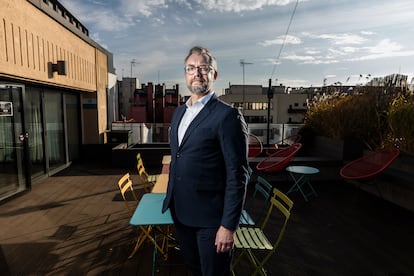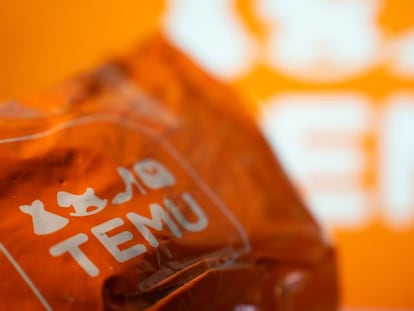Shein’s strategy for Europe and the US: ‘We only make 200 copies of a garment. If it’s successful, we mass produce it’
Peter Pernot-Day, head of strategy at the Asian giant, argues the company is committed to ‘transparency,’ despite the fact that it does not make its business figures public and is under scrutiny for its supply chain


Shein has emerged as a significant disruptor in the fashion industry. However, little is known about its business operations. Only that the company is valued at $64 billion following its latest round of financing, sells in 150 countries, and employs around 16,000 people — just 10% of Inditex’s workforce.
There is speculation that Shein’s revenues have already surpassed those of Inditex (the owner of brands such as Zara), but the company — now based in Singapore after originally being founded in China — does not disclose its financial information. Shein — which operates solely online — is rumored to be focused on an imminent IPO, while concerns persist regarding whether its supply chain meets basic labor rights standards. Peter Pernot-Day, the head of strategic and corporate affairs for North America and Europe, refrains from commenting on what he calls “speculations.”
Question. How do you define Shein’s business model, how it works, and its impact on the fashion industry?
Answer. Our vision is to make fashion accessible to everyone. The principles behind that idea have led to the creation of something that is unique in the sector. A model that allows us to make between 100 and 200 copies of a garment in an initial phase, put them on sale on our website and check the interest they generate among our customers. Only when we detect that this is happening, we manufacture them. This allows us to offer a wide variety of garments at an affordable price.
Q. Shein is not the first company to offer clothes at low prices.
A. But our innovation solves a problem in retail. Everyone wants to put the consumer at the center, to make sure that they like the clothes… Our model really allows customers to choose what they want to wear. They are not limited to a specific design or a capsule collection. For us, that has changed the industry. Another point is the reduced production costs, as we only create a limited number of copies and refrain from producing more until we identify what will sell. We are able to significantly reduce the associated expense. Some estimates suggest that excess inventory in the industry ranges between 20% and 30% of total stock. Our levels are significantly lower. It is another area that we are changing with respect to traditional retail.
Q. Shein is a Chinese company, but it moved to Singapore. Why did it make that move?
A. We have a model that tends to localize. We are present in 20 countries, and we have branches in key markets: in North America, in Latin America, especially in Brazil, and in Europe, mainly in Dublin and Poland. Having these local teams allows us to reach a larger customer base. We sell mainly outside of China. And I think the move to Singapore was a logical step in orchestrating that strategy.
Q. Not much is known about its founder, Sky Xu. There are hardly any photographs of him.
A. He is one of the four founders of the company and the current CEO. He is deeply involved in the day-to-day operations, vision and strategic direction of the company. He is a visionary leader in his contribution to retail, especially in the concept of an on-demand model.
Q. We don’t know much about the company’s figures either. Why aren’t they public?
A. We are a private, non-listed company, so we do not detail our figures.
Q. Many private companies publish their financial results.
A. Our position is to comply with all laws, regulations and requirements that are placed on us. If there is a legal requirement to disclose our information, we will follow it to the letter. For example, we publish the accounts for our U.K. subsidiary. [Shein U.K. reported turnover of around $2 billion in 2023]
Q. Shein’s profits are estimated at $2 billion and $45 billion in merchandise sold. Are these numbers correct?
A. I can't confirm that.
Q. So your company’s figures are left to third-party estimates.
A. As I say, we are committed to being transparent where the law requires it. There are many ways to run a business, and we have chosen to be transparent in the areas where it is necessary, but we are not going to disclose anything about our current financial situation.

Q. Do you think Shein is a transparent company?
A. We like to talk about our business, to be open and accessible to governments, to civil society and to the press. I think transparency is a somewhat subjective term. We think we are very transparent. Others may disagree. It depends on the perspective. We comply with all the transparency, governance and disclosure rules that apply to private companies. If the law requires it, we disclose [information]. We have done a tremendous job of being transparent. No company is 100% transparent. Apple will never tell you what new product they are going to develop.
Q. Is the company prepared to share all the information required of a listed company?
A. Shein has robust governance and accounting, as well as leadership controls. We have an international management team with decades of experience. I cannot comment on whether we will go public or not. I have a lot of trust in my colleagues.
Q. Will Shein be listed on the London Stock Exchange?
A. I can’t comment on speculation.
Q. It is public knowledge that Shein has registered the documents to do so.
A. I am aware of this information, but I cannot confirm or deny it.
Q. It has been reported that U.S. regulators have not allowed Shein to float in New York over alleged problems with labor abuses. There are similar concerns in the U.K.
A. I can't comment, because I can't confirm whether there is a process. I would say that any multinational of our size and scale should be scrutinized, whether by governments, regulators, or media, or customers. We are open and prepared to answer those questions. I don't think it would be inappropriate to receive them.
Q. What are Shein’s relations like with the Chinese government? It is said that they did not like your move to Singapore.
A. We are a Singapore-based company and have government relations teams in the major areas where we operate. Our main focus is building our business and delivering products to customers. I cannot provide further details on discussions with any government agencies.
Q. Will Shein go public sooner or later?
A. Again, I can’t comment. I would say that if we did that process, the main driver would be to improve transparency, as we have been asked to do. Those kinds of demands that are being made of us would be resolved. If the company decided to do that, that would be one of the benefits.
Q. Are concerns about labor practices in China justified?
A. In our sustainability report we include details about audits, analysis, where we fell short, and that says a lot about our commitment to ensuring that there are no labor abuses in our supply chain. We have a zero-tolerance policy, and if there are cases, we disclose them and take action. We work to make the supply chain pleasant for all workers. That means paying wages, making facilities safe, and making sure there is no child labor or abuse.
Q. How many suppliers do you have?
A. Some 5,800. Most of them micro, small and medium-sized companies. Part of the success of our on-demand model is in these types of companies. Attracting them to our supply model has been very transformative.
Q. Shein has been implicated in purchasing cotton from areas of China, such as Xinjiang, where labor abuses have occurred. Does the company purchase cotton from that area?
A. I think the best person to answer that question is a company called Ortain [dedicated to verifying the origin of cotton], with which we work, and which would explain our cotton program.
Q. Does selling an evening dress for $15 generate of a profit margin?
A. The business is profitable. We have shown that there are many inefficiencies in the traditional retail model that can be solved with technology. And that is where customers win. One of the big misconceptions about our business is that we sell cheaply because of volume. No. We achieve economies of scale through cost efficiencies, such as avoiding excess stock, or by selling purely online. Physical stores have many advantages, but they can also be very expensive. We save by avoiding those costs, and that is how we set our prices.
Q. Does Shein plan to have physical stores?
A. Not at the moment. We will continue with the experience of pop-up stores, and I don't see them becoming permanent.
Q. Shein has been accused of copying designs. Do you have a problem with that?
A. We take protecting intellectual property rights seriously. The controls we have introduced include a team in California and China that reviews products to ensure they do not infringe other intellectual rights. They are supported by an artificial intelligence platform that scans images and compares them. Customers can even alert us that a product may be a copy.
Q. Now, it is Shein that is accusing Temu of copyright infringement.
A. Shein and Temu are involved in a lawsuit in the U.S. We have filed a lawsuit and are awaiting a court date. I cannot comment further.
Sign up for our weekly newsletter to get more English-language news coverage from EL PAÍS USA Edition
Tu suscripción se está usando en otro dispositivo
¿Quieres añadir otro usuario a tu suscripción?
Si continúas leyendo en este dispositivo, no se podrá leer en el otro.
FlechaTu suscripción se está usando en otro dispositivo y solo puedes acceder a EL PAÍS desde un dispositivo a la vez.
Si quieres compartir tu cuenta, cambia tu suscripción a la modalidad Premium, así podrás añadir otro usuario. Cada uno accederá con su propia cuenta de email, lo que os permitirá personalizar vuestra experiencia en EL PAÍS.
En el caso de no saber quién está usando tu cuenta, te recomendamos cambiar tu contraseña aquí.
Si decides continuar compartiendo tu cuenta, este mensaje se mostrará en tu dispositivo y en el de la otra persona que está usando tu cuenta de forma indefinida, afectando a tu experiencia de lectura. Puedes consultar aquí los términos y condiciones de la suscripción digital.










































